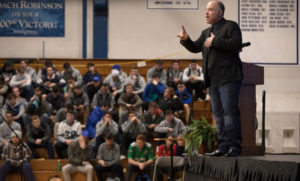By Sarah Frazer || Contributing Writer

This week’s Common Hour, featuring author, scholar, and activist Jackson Katz, focused on violence against women, an issue which he argued is one of the most prevalent on college campuses and in our broader society today.
More specifically, Katz addressed and rejected the common narrative that domestic violence, sexual assault, and rape are “women’s issues.”
While women are undoubtedly and profoundly impacted by these issues on every level, these are men’s issues too.
Katz warned the audience early on that he would say some provocative things.
Referring to these problems, for instance, Katz explained that men are the overwhelming perpetrators of such crimes.
He continued that men have been raping women, children, and other men for thousands of years. But there were never 800 numbers for people to call, until female leaders made it happen. Just as women have been on the forefront of combating sexual violence for decades, Kats contended, now it is time for men to step up and take on a leadership role.
According to Katz, more of a focus needs to be placed on holding offenders accountable; helping their victims is not enough. He contended, for instance, that society should spend less time asking “how many women have been assaulted on college campuses” and should ask, instead, “how many men have assaulted women.”
According to Katz, the use of passive language in the former question shifts accountability away from the perpetrators of the crimes.
Establishing that violence against women is a bad thing that happens disregards the matter of who is committing the violence against them. Katz asserted, “it’s not anti male to be accurate and honest.”
Katz pointed out a misconception about efforts to prevent or lessen sexual violence: women have benefitted from such efforts while men have either not been affected or may have even been hurt by those efforts.
Refuting this false belief, Katz cited the effects of domestic violence on children.
For instance, the experience of a child witnessing their mother being raped is deeply traumatic. Boys who have been abused are something like 10 times more likely to be abusive themselves, explained Katz, as abusive behavior is part of a defense mechanism they developed early in life.
“Domestic violence is a pervasive problem in our society and it spills over in so many ways,” Katz said.
To demonstrate this fact, Katz offered the case of mass shootings, fifty seven percent of which that have been committed recently in the US have been related to domestic violence.
Katz took issue with the narrative that feminists are man-hating “feminazis.” He affirmed that “overwhelmingly men are the perpetrators of sexual assault, but they are also the victims.”
And indeed, the first people to open up the space to talk about men as victims were feminist women. But men need to be more involved and need to assume more leadership roles. Sadly many people haven’t heard men say this, according to Katz.
Furthermore, calling these issues women’s issues allows men to tune out and not think about it. He explained, “I as a man am going to do whatever I can as a man…to not be silent [in the face of men’s sexism].”
Katz expressed, “the reason I’m saying [these things] strongly is because I have the microphone and because I’m a man.”
He advised the audience to “take seriously the fact that you have certain advantages in life,” whether those advantages be in terms of one’s gender, race, sexual orientation, socioeconomic status, or otherwise.
Katz described the process by which all discussions of gender and racial problems, among other societal ills, are tilted in favor of the dominant group.
“In each case the dominant group is not paid attention to, as if white people do not have a racial identity…this is one of the ways that dominant groups maintain themselves and their dominance.”
He continued, “often the dominant group is rendered invisible” so that they aren’t even involved in the conversation as if they do not need to be.
One reason men should take these problems seriously, according to Katz, is that they are “the primary victims of all violence besides sexual violence… And the same system that produces violence against women produces violence against men,” that system being one in which men are taught from birth to behave aggressively and that their poor behavior will be dismissed.
Another reason to care, Katz explained, is that “it is so preventable… You need to think about what you can do in your sphere of influence” to improve these issues “ not because you’re a nice guy helping out women but because you’re a leader.”
Katz advocated for a paradigm shift in the way we view sexual violence, as something that is perpetrated by so called normal people.
“This makes people uncomfortable because [they] wish that the typical perpetrator was some monster.”
Katz acknowledged that confronting peers or friends about their bad behavior is challenging. At the same time, his approach has been to encourage bystanders to speak up and create an environment where everyone around says certain behavior is not okay. “The standard you walk past is the standard you accept” is another way to put it; “in other words, your silence is viewed as consent or complicity.”
Quoting Martin Luther King, Katz expressed, “in the end what will hurt the most is not the words of our enemies but the silence of our friends.”
Katz asked, “don’t we know that men’s attitudes towards women have a direct impact on men’s actions towards women? …And can you imagine [living] in a society where hearing male leaders [speaking out on these issues] was normal and not extraordinary?” Katz argued that as a society, “we need to raise the bar” since “just saying I’m not a rapist is not particularly [a high standard].”
At the end of the day, according to Katz, “we need people with integrity to step up.”
Junior Sarah Frazer is a contributing writer. Her email is sfrazer@fandm.edu.